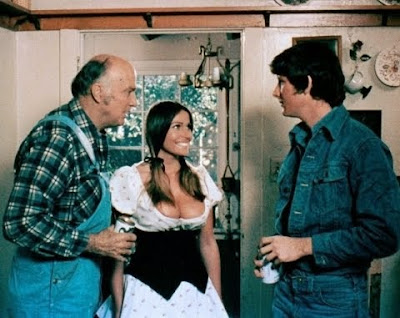Pleasantville
The notion of "utopia" eludes us daily as we gaze upon a far from perfect, fractured world. Pundits tell us this world is likely to split apart at any moment. As if we needed them to tell us that. We see evidence from our level, as relationships may sour and our attempts to make a living sometimes breed discontent and a feeling of being "caught in a ticking trap." So what is a utopia? That definition would vary from person to person. Most would say something about harmony, peace, the absence of strife. The divisions among those questioned would be revealed by those who cite the sorts of freedoms we should have. How can there be a utopia if no one can agree upon what it should be?
PLEASANTVILLE is a 1998 film that addresses this idea. It is also the name of a fictional 1950s TV show that David (Tobey Maguire), a lonely high schooler in 1990s America, spends most of his time watching. Pleasantville is a "perfect" place, a lily white suburb where it's always sunny and 72 and none of the home team ever misses a basket. The women toil in the kitchen all day long as they await their husbands. A scenario that is meant to exemplify what someone considers the ideal lifestyle. Someone's utopia. David loves the program because it's so different from his real life, where things aren't so neat and orderly.
His sister, Jennifer (Reese Witherspoon), happily goes about chasing teenage things like popularity and cheerleading. She's also sexually active, how 90s?! Were there girls like her in the real 1950s?
Of course, but shows like Leave it to Beaver would have us born laters believe that any such person was mentally unstable or at best, just troubled souls who needed counseling. "Good" people played collegiate sports, obeyed their parents, and went to church. Anyone else was a juvenile delinquent.
One night, David and Jennifer fight over the television remote control and through a series of rather preposterous developments (not the least of which involves a celestial Don Knotts) find themselves literally transported into their TV set and into Pleasantville. They assume the roles of the program's lead son and daughter, Bud and Mary Sue Parker. And, OMG, they're now in black and white!
Pleasantville will soon undergo some drastic changes. Characters will begin to be seen in color. This is meant to symbolize some sort of awakening. Visually, it's pretty nifty.
Thematically, it seems like a gimmick. David and Jennifer's influence is played by director and writer Gary Ross as catalysts for what many would consider positive things: acceptance of change, free thinking, free will. An antidote for the "recipe for insanity" that clean cut 50s life espoused.
Their TV mom Betty Parker (Joan Allen) will, for the first time, question her role in Life. Maybe she wasn't supposed to marry George (William H. Macy), he of the crisp broadcloth shirts and bowling nights. She discovers (in an awkward and curious scene) the assets of pleasing one's self in the bathtub. She'll later wander over to the malt shop run by Bill Johnson (Jeff Daniels), an artistic type who's a cool cat cause after all, he's playing Miles and Brubeck on the juke. But he also not only convinces Betty to pose nude for a painting, but dares to hang it in the window of his shop!
This act will incite the first act of violence in Pleasantville. An act of defiance of change. Some folks just won't embrace progression.
What bothered me during PLEASANTVILLE was that very notion. The filmmakers preach for two hours, very heavy-handedly telling us that this black and white scenario should be subverted, turned upside-down, overthrown. There seems to be this consensus that moving forward involves some sort of metamorphosis, a violent one. A social and political coup d'état. Sure, there need to be revolutions. But for enduring change? That's a more gradual thing. Posing nude may be one person's idea of cutting loose and being free, but Ross doesn't seem to even being open to disagreeing with that point. It's like that guy who who never dances and then one day, in a fit of something or other, flings off his jacket and jumps on tables. Look! He's free! He's released himself from the shackles of inhibition! Well, maybe so, or, he could just be lost in a moment of intoxication or bald narcissism. Like Richard Gere's character in MR. JONES, randomly kissing people on the street.
True freedom is the right to choose, not being told that you need to do something radical. Sometimes, a radical shift is freedom, is what is needed. Sometimes, the freeing act is finding your purpose, quietly. Not very cinematic, though? I wanted to appreciate PLEASANTVILLE, but ironically it is as one note as the characters and way of life it criticizes. There are some good moments, such as when a character experiences sex for the first time, we see a flower opening. It sounds cheesy, but it is an elegant picture of discovery, artfully presented, if a bit too obvious. And what about viewers who may be offended by this scene? Is it their problem? That's what I got from the solemn tone of this movie. The film plays like a scolding funeral dirge.
PLEASANTVILLE does not fail as a visual wonder, or even with its metaphors. I was just irked by the one-sidedness, the refusal to acknowledge that just because someone lives a certain way, they're somehow wrong or needing liberation. I will never forget the elderly lady sitting in front of me in the theater, how she reacted when characters in this movie wondered "can you really be happy in a poodle skirt?""Yes!" she cried. It was nice to hear a dissenting voice to the movie that was advocating dissention.
Part IV, The Great Overrated Series



Comments